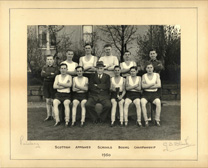themes
themes
Page 4
Go to page: 1 | 2 | 3 | 4
Oral History
Recreation and Sport
Recreational and sporting activities were fairly limited in Kibble's past, largely due to financial constraints, so staff had to be creative in planning these:
“Physical Education was non existent, but the School had an excellent football team, even with those huge clod hoppers we were issued with in the beginning.”.
(Bob Burniston, Kibble pupil, 1956-1958. Now living in Canada, retired Toronto Police Fitness Co-ordinator and champion amateur athlete)
“…you’d probably finish up with maybe about twenty-five, thirty kids every weekend in the school, you know? And we had five/six staff to occupy these thirty kids over the weekend and that’s when, you know, taking them sailing, hill-walking, you know, football, billiards – we had a big billiard room.”
(Sam Hill, Carpentry Teacher at Kibble 1963-1995)
“…that was quite difficult ‘cause there was no money about. Em…we had free passes to get into the swimming, but that was like the top ‘thing’, if they went swimming. …or you went on a van run, that was the next most popular, just out, touring about in the van. Just anywhere you wanted to go just to get these kids out. Ah…we would provide badminton for them or, at that time we had computers, if you’d like to call them computers – it was the old BBC computers and the only thing I can remember, it was ‘Chuckie Egg’, that was the game, and it was the only game we had in the school. So, that was their activities in the evening and they weren’t allowed to not take part.”
(Jean Logan, Residential Social Worker at Kibble from 1986, currently Operations Room Manager at the Safe Centre)
Michael Smith worked at Kibble as a Night Care Officer from 1973 – 2005. He told us about recreational trips to Inverbeg with boys and also recalls the lack of money for activities:
“There are smashing rock pools there- big, deep rock pools - and there are big, lovely cliffs. And the pastime was to go up there and find the highest part and we all had this jump, and we(staff) had to do it as well. I must admit, I wisnae enamoured at doing it but I did it. We took them up there and was reminded that there was to be no jumping off the rock face into the pool. So we got there and I said, “Now remember, you’ve no’ tae jump aff the rock face”. And the boys said, “Aye, that’ll be joking”, in their inimitable fashion. It was just at that transitionary period when people we thought were interfering with the fun. But you never had a lot of money, you just went for a day out and you thought, “How do we occupy them?” You cannae go along the fields, picking daisies or throwing stones in the water. These are boys who need a lot to be doing. These were the things that were done, and it was hard to break away fae that. Although we did discourage them…me, I took a dim view of curtailing a lot of activities, like building fires on the beach and things like that, ‘cause that’s what boys dae – even in my seventies, even old boys (Laughter)”
Although nowadays, many such activities would be ruled out due to Health and Safety regulations, there is a wide range of recreational and sporting activities on offer to pupils, as well as greater recognition and acknowledgement of the learning opportunities that these can provide:
“…it’s absolutely fabulous because it brings in all sorts of things like their fitness, the skill of actually negotiating some of these trails in the forest, reading a map…eh…taking a shot at the responsibility of being the leader. I always say the slowest guy is actually the guy who determines the pace, not the fastest guy, so they have to take responsibility for setting a suitable pace. And then again, they’re out in the wilds and they’re looking at things, and they’ll often stop and say, ‘Check it out – there’s an eagle sitting on that post over there’. They’ll say it’s an eagle; it’s actually a buzzard. Yes, and…say we stop for lunch and maybe somebody throws a crisp packet away and…eh…you get somebody who has been with us before and you just say to them, ‘Okay, what’s the message to that person?’ ‘Pick it up. The only thing we leave around here is footprints.’”
(David Speirs, Electrical Instructor from 1984, Principal Teacher, Science and Technology until 2008, discussing mountain biking in Queen Elizabeth Forest Park)
Conclusion:
If you are interested in finding out more about the oral history of Kibble, or perhaps you would like to contribute to it by telling your own story, please contact Elaine Harris, details are below.

